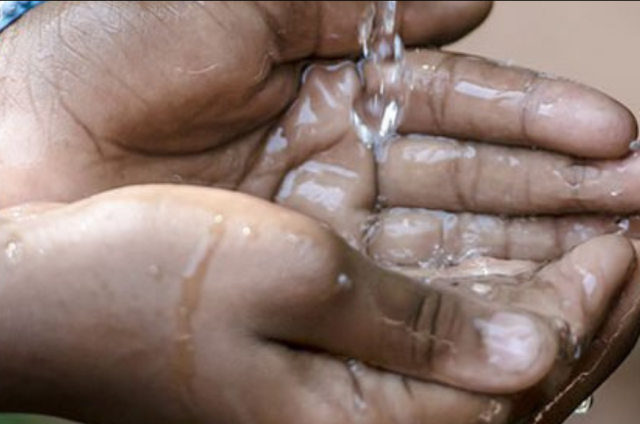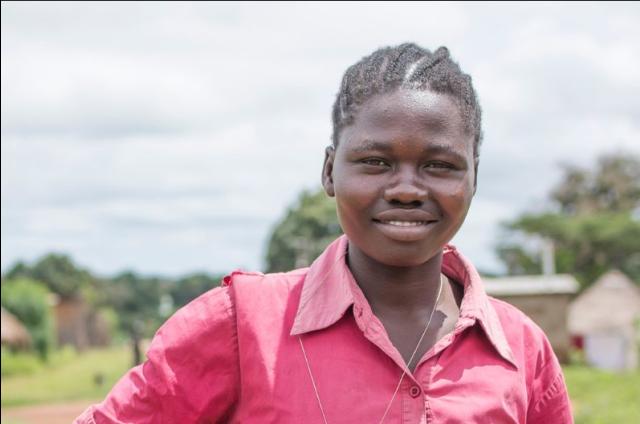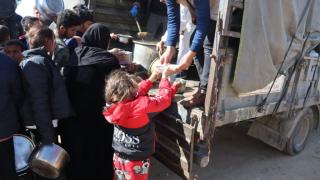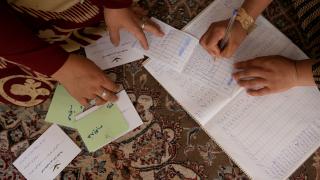Water, Sanitation, Hygiene & Healthcare in Conflict
Water, Sanitation, Hygiene and Healthcare in Conflict Settings
Women’s regular health needs do not disappear when conflict erupts or war breaks out. Instead, they become more critical
In 2023, 14% of the world’s population was within just 5km of violent conflict (source: University of Southampton).
In times of war and conflict, women struggle to obtain adequate food, safe drinking water and basic sanitation and healthcare. Women, who are often primary caregivers and the most vulnerable, face unique challenges during these times. They often lose access to contraception, hygienic period products, maternity care and protection from sexually transmitted infections – while facing an increased risk of sexual and intimate partner violence.
Use the links below to explore some of the impacts of war and conflict on women's need for/access to:
CONFLICT & WASH
Water, sanitation and hygiene
x2 People living in fragile contexts are twice as likely to lack safely managed drinking water and basic hygiene, helping waterborne diseases to spread.
(Source: UNICEF)
Safe drinking water, sanitation and hygiene (WASH) are crucial to our health and well-being. These basic needs are a prerequisite to good health and other essential aspects of our lives; supporting children’s attendance at school, our ability to have livelihoods and supporting people to live in dignity.
When war and conflict take hold, WASH services are severely disrupted. Despite international humanitarian and human rights law, WASH facilities continue to come under attack in conflict-affected areas, large populations are often crammed into overcrowded areas that are not equipped to meet the need, and unstable governance makes providing necessary resources and facilities a challenge. These vulnerable contexts are also most impacted by additional threats, already weak when climate disasters strike or during crises like the COVID-19 pandemic, which spread like wildfire in refugee camps and other overcrowded spaces with limited WASH facilities.
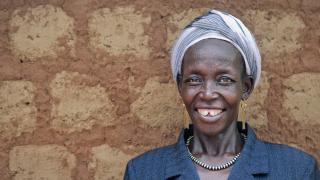
Clean water in south sudan
Educating women in our programme
We train women in our programme to understand the importance of good health and hygiene practices, how best to avoid preventable diseases and how they can support their family's nutrition. Regina, a graduate of our programme in South Sudan, has used newfound knowledge to educate and mobilise other women in her community to ensure they have access to safe water – even in the dry season.
Girls and women are particularly vulnerable in conflict and post-conflict settings, where the lack of water and sanitation services can restrict their involvement in daily activities and impact girls’ long-term growth and development. Girls and women are often responsible for fetching water, so when water collection is harder and they have to walk further, it takes up more of their time and exposes them to violence on their journeys.
Additionally, sanitary period products can be almost impossible to access during humanitarian crisis. Even if girls and women do have supplies like pads, without clean water, safe toilets and suitable washing facilities, their personal hygiene is in jeopardy. This can lead to health complications like urinary tract infections and bacterial vaginosis – which are then hard to treat without access to healthcare during times of crisis.
Grace's Story
Reusable pads in Nigeria
Women for Women International works in Nigeria, which has grappled with conflict and instability for decades. Coupled with poverty and low rates of girls’ education in the areas where we serve, as well as widespread shame and stigma around periods, many girls and women struggle to care for themselves when on their periods. An estimated 37 million girls and women in Nigeria experience period poverty, meaning that they are unable to access or afford menstrual products like pads and tampons, in addition to pain medication and underwear (source: SSRN).
Most of them use unhygienic materials like rags, leaves and even cow dung because they cannot afford disposable period pads.
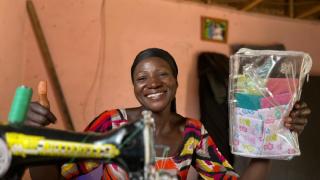
Since learning about the dangers of using these unhygienic materials in our programme, Grace has been passing on her knowledge to other women and introducing them to reusable period pads she has made, with tailoring skills also gained in our programme.
Grace has also been educating her daughters, who are passing this knowledge on at their schools. This will help to keep women and girls in her community safe – and this new livelihood from making and selling safe pads is helping her to support herself and her family.
CONFLICT & HEALTHCARE
Access to medical infrastructure
60% 60% of preventable maternal deaths occur in fragile and conflict-affected states.
(Source: WHO)
Either through intentional strikes as an illegal tactic of war, tragic collateral damage or breakdown of society, war leads to the collapse of healthcare infrastructure, resulting in a shortage of medical supplies and healthcare professionals.
Nearly a quarter of the global population currently lives in settings affected by conflict, displacement and natural disasters. Many of these settings also have weak national health systems, which makes it a challenge to deliver basic health services where they are most needed. As a result, it is fragile and conflict-affected states that also suffer especially high rates of disease and death. More than 70% of cases of epidemic-prone diseases like cholera, measles and meningitis, and 60% of preventable maternal deaths (due to lack of access to prenatal and postnatal care) exist in these contexts (source: WHO).
Maternal health in Afghanistan
giving birth on the roadside
In November 2023, Pakistan forcibly returned refugees without documentation – including some 1.7 million Afghans who had fled violence and persecution, or simply desired education for their daughters, in the aftermath of the Taliban's takeover in August 2021 (source: IOM). Hundreds of thousands flooded the border, attempting to make their return before getting arrested.
Our Country Director in Afghanistan, Payvand Seyedali visited the Torkham crossing alongside one of our local women-led organisation partners, the Afghanistan Midwives’ Association.
Following her visit, Payvand shared:
"Within the first few minutes of arriving to the refugee camp, we were told horror stories about the border crossings ... Two men told us their wives were forced to give birth in the dirt the night before. Only men stand in line for flour and oil distribution – which means women-led households often miss out"
Women-centred healthcare is a striking gap in aid at the border right now.
"The closest hospital is hours away, and heartbreakingly, we were told stories of women needing Caesarean sections who died before they could be cared for. Others died from infection or post-natal complications."
Conflict & Mental Health
the psychological impact
10-20 For every instance of rape reported in conflict, an estimated 10-20 go undocumented.
(Source: UN)
As well as the physical toll war takes, the psychological impact is profound. Women in conflict zones are at high risk for mental health issues such as post-traumatic stress disorder (PTSD), depression and anxiety. The constant stress and trauma of living in a conflict zone exacerbate these conditions, as well as the loss of their social networks to support them and limited access to mental health services.
Women also become increasingly exposed to incidents of sexual and intimate partner violence during wartime and in post-conflict settings, which cause additional trauma and isolation, particularly where stigma and shame towards rape survivors are prevalent. This is in addition to unwanted pregnancies and exposure to sexually transmitted infections.
While struggling with their mental health, women are often forced to continue their caregiving responsibilities, often becoming the heads of their households if their husbands are killed in war or forced to stay behind to fight while women and their children flee. They are therefore forced to find work – and for many of the women we serve, this will be the first time. This is made especially difficult with the loss of social networks so often erased by war, poor physical and mental health, lack of education and experience (girls are 90% more likely to be out of secondary school in fragile, conflict and violent settings than those not (source: World Bank) and, among the women we served in 2023, only 33% had some level of literacy). For those who have become displaced, this financial stress as women seek livelihoods can be compounded by limited knowledge of the local language or systems.
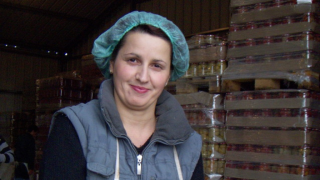
Meet Olga
"Meeting my therapist is what helped me to survive and not to go crazy with grief. I feel that I am not alone."
When Olga lost her husband to war in Ukraine, she fled to Poland with her son.
Once a lawyer, Olga found herself jobless in a foreign place and in severe psychological distress. Read her story, sharing how she found a way out of crisis and took steps to rebuild her life.
keep reading
Mariam
subtitle:
Mariam* has been working with us to document the deteriorating situation in Gaza. While living through the horrors of war herself, she dares to lift the stories of other Palestinian women.
Over 4,700 of our programme participants in Afghanistan were provided with crucial supplies against coronavirus. With these kits, women could put lessons about health and hygiene from our programme into practice, to protect themselves and their families from disease.
We Are "Hanya"
subtitle:
Women entrepreneurs in Iraq are preventing the spread of COVID-19.

